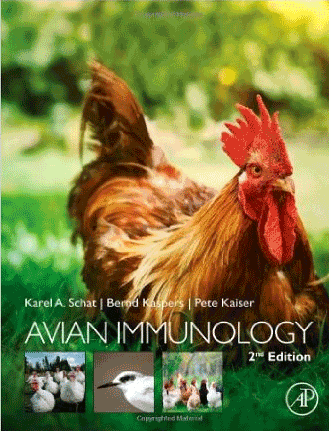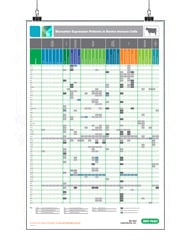Importance of Chicken Immunology Research
Biomarker Expression Patterns Posters
s
Chickenology
Professor Pete Kaiser, Deputy Director and Head of Division of Infection and Immunity, The Roslin Institute and R(D)SVS, University of Edinburgh
Why study immunology in the chicken, when despite our best efforts far more is known about immune responses to pathogens in mammals, particularly in biomedical model species such as the mouse (where there are far more reagents too)? Why not simply extrapolate from knowledge in mammals and assume that mechanisms are similar in the chicken? Surely responses to viruses, bacteria, protozoan and other parasites will be broadly similar in mammals and birds? After all, these two vertebrate classes share similar climatic and geographic niches, ranges of longevity, body sizes and social groupings, as well as the spectrum of pathogens with which they are challenged.
In broad terms, responses to pathogens are similar between birds and mammals. The two broad arms of the immune response, innate and adaptive, are present in both. Adaptive responses include both cell-mediated and humoral responses in both. Immunological memory is generated in both, which is just as well for the poultry industry, as it would not exist on such an intensive industrial scale without vaccines. However, when one looks at the detail of the organs, cells and molecules of the immune response in mammals and birds, one begins to understand that in many respects the detail is different, that birds and mammals achieve the same overall responses in very different ways, and that in many respects the avian immune system is simpler. To quote Jim Kaufman, “birds are not mice with feathers”. It remains an interesting philosophical question as to why mammals have a more complex immune system – is there some evolutionary advantage to having a more complex immune system, or is there an evolutionary advantage in having the mechanisms by which a more complex immune system was developed, and the more complex system is simply a consequence of those mechanisms?
There are other, more practical, reasons of course to study the immune system of birds, particularly that of the chicken. The health and welfare of poultry are central to efforts to address global food security – over the past two decades poultry has increased from 21.2% to 33.4% of world meat production (1990-2010; USDA, Foreign Agricultural Service, Production, Supply and Distribution) and is expected to overtake pork to become number one within the next 5-10 years. In terms of sustainability/efficiency of the industry, as measured by FCR, chicken is already ahead of all other major meat sources. Poultry are also a significant source of zoonotic infections, as exemplified by avian influenza, Salmonella and Campylobacter. The nature of the challenge presented by infectious disease in poultry is continuously changing as the result of environmental change, changes in legislation or market forces that require changes in practice, and pathogen evolution, and the development of large-scale poultry production in developing countries, particularly the BRIC countries and others in South-East Asia. Legislation in certain parts of the world, leading to the discontinuation of the use of antibiotics and other drugs, necessitates the search for alternative methods of control, including vaccination. Welfare and consumer preference considerations similarly in some countries are driving a move to outdoor rearing which results in changes to the spectrum of pathogen challenge. There is increasing evidence that vaccination using live attenuated vaccines may be selecting for increased virulence of important pathogens. Finally, it is becoming apparent that (probably) all pathogens engage the host’s immune response, particularly the innate immune response but also in some cases the adaptive, in order to subvert that response and gain sufficient time to replicate. It is therefore essential that we continue to study avian immunology and host-pathogen interactions to maintain and improve poultry health and to find novel and sustainable solutions for the future.
Although the chicken has the best studied immune system of all birds, the development of reagents and research tools for studying avian immune responses still lags behind the plethora of available tools for studying the systems of biomedical model species (mouse, rat and human) or, for that matter, other mammalian agricultural species. Considerable progress has been made in recent years, funded in the US by the USDA through its Veterinary Immune Reagent Network initiative, and in the UK, previously by the BBSRC’s Veterinary Immunology Toolbox and now by a Wellcome Trust Biomedical Resources grant to the National Avian Resource Centre at the National Avian Research Facility (NARF; www.narf.ac.uk at The Roslin Institute, University of Edinburgh. This includes a dedicated post-doctoral position to generate avian reagents, targeting reagents to molecules prioritized by the UK avian research community.
It has become obvious that the best way to make reagent development efforts sustainable is to commercialize the reagents with partner companies, rather than each lab try to share them with the community. Bio-Rad has been very active in this area, both with reagents for mammalian agricultural species and now for avian species, primarily, of course, the chicken, marketing a wide range of chicken reagents including monoclonal and polyclonal antibodies and recombinant proteins.

Avian Immunology
Published 1 April 2013; ISBN-10: 0123969654; ISBN-13: 978-0123969651
The second edition of Avian Immunology provides an up-to-date overview of the current knowledge of avian immunology. From the ontogeny of the avian immune system to practical application in vaccinology, the book encompasses all aspects of innate and adaptive immunity in chickens.
In addition, chapters are devoted to the immunology of other commercially important species such as turkeys and ducks, and to ecoimmunology summarizing the knowledge of immune responses in free-living birds often in relation to reproductive success.
Biography

Professor Pete Kaiser is Director of the National Avian Research Facility, Deputy Director and Head of the Division of Infection and Immunity at The Roslin Institute and Royal (Dick) School of Veterinary Studies and Chair of Animal Infectious Diseases, all at the University of Edinburgh.
Pete has authored approximately 150 primary research papers, primarily in avian immunology and genetics, and is currently supported by grants from the BBSRC, Wellcome Trust, EU, industry and charities. Industrial collaborators include Zoetis Animal Health, CEVA Sante Animale, Cobb-Vantress, Hy-Line and Aviagen. He holds visiting appointments at the Universities of Queensland and Liverpool and is on the Editorial Boards of 7 journals. He is a trustee of the Houghton Trust, a member of the BBSRC’s Animal Disease Working Group and the Peer Review Panel of the Danish Council for Strategic Research, Chairman of the Comparative and Veterinary Immunology Affinity Group of the British Society for Immunology, an external examiner at the Universities of Leeds and Putra Malaysia, and has supervised 31 PhD students.
His research focuses on understanding host-pathogen interactions in birds, particularly but not exclusively chickens, to deliver practical outcomes, especially novel and improved vaccines and breeding for disease resistance. As Director of the National Avian Research Facility (NARF; http://www.narf.ac.uk/), he aims to develop NARF as a world-leading centre of excellence for poultry research. NARF has the infrastructure, genetic and transgenic stocks of chickens, disease models, transgenic technologies and expertise in genetics, genomics, immunology, pathogen biology, welfare, production and developmental biology necessary to deliver solutions to maintain chicken as the world’s foremost source of animal protein, thus addressing the food security agenda.




